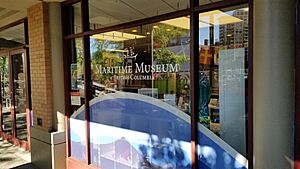Maritime Museum of British Columbia facts for kids

Maritime Museum of BC in July, 2024
|
|
| Location | 744 Douglas Street Victoria, British Columbia V8W 3M6 |
|---|---|
| Type | Maritime museum |
The Maritime Museum of British Columbia (often called MMBC) is a cool museum in Victoria, British Columbia, Canada. It helps people learn about the amazing history and culture of the sea in the Pacific Northwest. They do this through fun exhibits, educational programs, and by letting people research old records.
The MMBC moved its main office in 2015 to Nootka Court on Humboldt Street in Victoria. Its huge collection of items was kept safe in a special storage building. In August 2021, the museum moved to its current spot on Douglas Street. This new place has space for exhibits, a research area, a gift shop, and offices.
Contents
History of the Museum
The Maritime Museum of BC first opened in 1955. It was started by naval officers at Signal Hill in Esquimalt, British Columbia. The museum's name changed a few times over the years.
Becoming a Non-Profit
In 1957, the Maritime Museum of British Columbia Society became an official non-profit group. This meant they would focus on protecting the history of the entire Pacific coast. The museum then moved to Bastion Square in downtown Victoria between 1963 and 1964.
New Locations and Changes
In 1981, a different group started the CFB Esquimalt Naval & Military Museum. This museum is still open today at Naden, on the Canadian Forces Base Esquimalt.
The museum's Bastion Square location closed in October 2014. The old courthouse building, where it was located, needed important repairs. Moving all the museum's items took over a year. The Society finished moving to Humboldt Street in July 2015. Then, in August 2021, the MMBC moved to its current home on Douglas Street. Here, they show special items from their collection and host traveling exhibits.
Collection and Exhibits
The museum has a very large collection of about 35,000 items. These include 800 models of ships and many other things related to BC's sea history. They also have a library with 6,000 books, including 200 very old and important ones.
What You Can See
The museum also keeps old records from local shipping companies and shipbuilders. There are logbooks, navy records, and plans for 1,800 different ships. You can also find maps, charts, an art collection, and about 36,000 photographs.
The Douglas Street location opened to the public in September 2021. The museum offers educational programs and talks for visitors. The exhibit space is used to show special items from their main collection and also traveling exhibits. Most of the collection is stored safely in a climate-controlled building in northern Victoria.
Research and Historic Boats
The museum has a special reference room for people who want to look at the library and old records. Volunteers and staff are there to help with any questions.
The collection also includes three historic small boats. One is the Tilikum, a 38-foot cedar canoe. It sailed around the world from Vancouver Island to London, UK, starting in 1901. Another is Trekka, a 20.5-foot sailboat. Its builder sailed it around the world starting in 1954. At that time, it was the smallest yacht to ever sail around the globe. The third boat is Dorothy, an 1897 fantail cutter built locally. Dorothy has been repaired and is now actively sailing.
Museum Connections
The Maritime Museum of BC works with several other groups. These include the B.C. Museums Association and the Canadian Museums Association. They are also connected to the Virtual Museum of Canada and Canadian Heritage Information Network. The museum is supported by the Hon. Janet Austin, who is the Lieutenant Governor of British Columbia.
See also
- Vancouver Maritime Museum, Vancouver, British Columbia
- International Congress of Maritime Museums (ICMM)
 | Bayard Rustin |
 | Jeannette Carter |
 | Jeremiah A. Brown |

